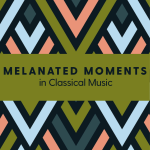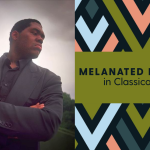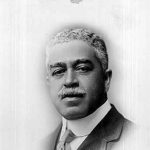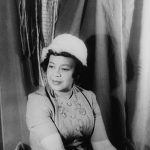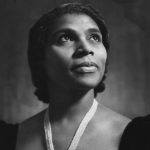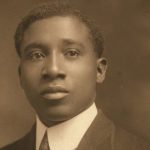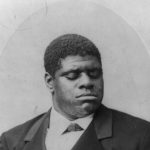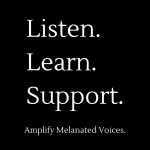Melanated Moments, S1E5: A Circus Act No Longer – Thomas Wiggins
Our featured composer in this episode, Thomas Wiggins, is one of the most talented musicians of all time… who also happened to be non-verbal, blind, and born into slavery. Joshua tells us how in his own time, Wiggins was portrayed as a circus act rather than a musical genius but is now starting to get the recognition he has long deserved.
Featured Music:
“Battle of Manassas,” by Thomas Wiggins
Music Plays (00:05): [MMCM Theme] Joshua Thompson (00:14): Welcome back. Welcome back. I’m Joshua Thompson. Angela Brown (00:17): And I’m Angela Brown. Unison (00:18): And this is Melanated Moments in Classical Music. Joshua Thompson (00:25): Angela, we’ve been hanging out for a little bit, doing this for a few. We’ve had some earth shattering performances, some names that maybe we haven’t heard before. And so guess what, Angela Brown (00:34): What? Joshua Thompson (00:34): I’m going to bring you another one. Angela Brown (00:35): What? Joshua Thompson (00:35): Are you ready? Angela Brown (00:36): Who?– Joshua Thompson (00:36): Okay. I’m gonna take you back to Civil War United States. This is not a place we, as melanated people, like to go back to, but we goin’ anyway. Angela Brown (00:44): Be easy… Joshua Thompson (00:46): I’ma do what I can. So this composer and this performer I’ve highlighted, his name is Thomas Wiggins, also known as Blind Tom. Have you heard of him? Angela Brown (00:56): I have heard of him! Joshua Thompson (00:58): Born in 1849, born into slavery. Angela Brown (01:00): Yes. Joshua Thompson (01:01): So again, like I said, we’re doing Civil War, so we know how this– how this is going to go. But he was born into slavery in 1849, and at a very, very young age, his slave owners noticed that Thomas wasn’t quite like everyone else. Um, because he, he couldn’t see, he was blind. He was Blind Tom, but he was also nonverbal– Angela Brown (01:24): Oh– Okay! Joshua Thompson (01:24): –He couldn’t speak. And so– as if I care about what a slave owner thinks, but if you were– what you gonna do with a blind, nonverbal slavehand? Well, they put them down on the piano. This guy is absolutely phenomenal. So– Angela Brown (01:37): Wait a minute– wait a minute. They put him on the piano– Joshua Thompson (01:40): On the piano! Angela Brown (01:41): Okay. So he was in the house evidently. Joshua Thompson (01:44): Right, you know, that’s– Angela Brown (01:44): They saw him, maybe heard him playing around or something on the piano one day– Joshua Thompson (01:48): I’m glad you said it. So, he’s non-verbal. We would consider that now, in modern times, very high on the autism spectrum. So that’s why I love highlighting him because, if we’re talking about ableism and all these things, you know, you don’t have to have sight or hearing, or even the, uh, the ability to speak, to contribute to the canon of music. They noticed, at a very young age, that he could mimic, perfectly, anything that he heard. Angela Brown (02:11): Wow. Joshua Thompson (02:12): So the birds, he would hear– perfectly mimics it. Uh, people would come and they would give speeches and he would immediately be able to memorize and recite back exactly what was told to him. I mean, instantly– Angela Brown (02:22): Though, he could not–he didn’t speak– on his own. Joshua Thompson (02:25): Not on his own– Nope. Angela Brown (02:26): If he heard something, he could mimic it back through speech? Joshua Thompson (02:31): –through speech and, later, mimic it back on piano. Angela Brown (02:35): Wow. Joshua Thompson (02:36): So birds and bees, you know, he would–he would, uh, he would be able to do that and come up with a song. There’s a piece that I perform now– it’s called, Water in the Moonlight. It’s gorgeous. And he heard it during a thunderstorm and just heard what rain sounds like falling in puddles during– and it sounds just like water in the moonlight. Angela Brown (02:52): Wow. Joshua Thompson (02:53): But for this piece, I wanted to pick Battle of Manassas. So, Battle of Manassas, for those of you– somewhat like myself– who really didn’t care for history class all that much– Angela Brown (03:03): You don’t act like it, chile, you– Joshua Thompson (03:05): I grew up– I’m a Blerd. I’m a Black nerd. It’s okay. It’s okay. There’s lots of us out there and blerds unite. So– not to bore, cause the music is really the important part, but– Battle of Manassas, by many historical accounts, honestly, is kind of like the first major battle of the Civil War. So what Thomas Wiggens does is he puts this to music, and I absolutely love it because it really gives sound to the sights and the intensity of the battle, from the calvary to the infantry. So at the beginning, you know, we’re starting with that calvary very far off at first, but getting closer…and closer…and closer… Music Plays (03:45): [Thomas Wiggins, “Battle of Manassas”] Joshua Thompson (04:02): So you see what I’m talking about? So the sound of the entering– the cavalry, that very beginning piece that– right? It’s the trappings of war and especially the American Civil War. But remember this is the life of a musical genius, but during this time he’s also a slave. And so in this next part, you can hear this melancholy and this– this longing. Music Plays (04:32): [“Battle of Manassas,” continued] Joshua Thompson (05:32): So, at the end there, you can hear things were escalating quickly and tensions and fury are ramping up. And as we go on, you’ll hear a rendition of the Star Spangled Banner– obviously referencing America– but all is not well in the Union– Music Plays (05:46): [“Battle of Manassas,” continued] Joshua Thompson (06:12): That part, right there– supposed to represent the cannons firing, this battle, and this battle breaks out and stuff hits the fan. And it’s just a– it’s a wonderful mess. Music Plays (06:22): [“Battle of Manassas,” continued] Joshua Thompson (07:03): So we all know battles are never neat and clean and tidy, uh, especially not the Civil War, but getting towards the end of the piece, clearly, things got crazy… Music Plays (07:14): [“Battle of Manassas,” continued] Joshua Thompson (07:39): So this was one of the more eclectic, but just as vibrant pieces that really displays his genius. But do you really think that he was lauded as the genius that he was back then? Angela Brown (07:51): Oh, of course not. Joshua Thompson (07:53): Well, give me, give me your top two reasons, probably, for why not. Angela Brown (07:56): Him was a slave! There’s that part– Joshua Thompson (08:00): There’s that part, right! Angela Brown (08:00): And, for what they would probably consider, he was handicapped. You know– But I mean, he might not have been able to speak or see, but there were no chains on his mind– It’s fascinating. Joshua Thompson (08:14): Right– It’s an intense music– I mean, I can only imagine what it must be like in the brain of someone like that. You know, you have to find another way to communicate and articulate feeling, expression, you know– Angela Brown (08:25): Can you tell me when this piece was written? Because the reason why I asked this, because I wanted to know when this piece came together for him as a musician. Joshua Thompson (08:35): 1861– So– and there’s the other part of it too. He’s very much living in the moment. And so he’s going to be composing for things that are relevant to him, things that he’s hearing in his lifetime, he’s instantly gona put it down. Um, so he would travel throughout the United States and even Europe with his slave owners, unfortunately, not even as a performer– like we think today, um, as far as, you know, headlining stadiums or concert halls– it’s very much like they would do back then– Angela Brown (09:08): A freak show. Joshua Thompson (09:09): –and that’s exactly what they call them. So you’re going to go check out the bearded lady and you’re going to go check out the muscle man. And then you’re also going to see– Angela Brown (09:16): The fattest woman in the world– or whatever. Joshua Thompson (09:17): Right and then you’re going to see– however they had him listed. And I love the fact that it’s out there and his pieces are out there because now he is finally being reframed with the respect and the level of dignity that he absolutely deserves. Unfortunately, because of who he was writing for and who he was owned by, there’s a lot of people– a lot of Black people, a lot of slaves, ex-slaves, and then also newspapers and periodicals that were owned by Black people– were not really a fan of Thomas Wiggins. They weren’t. Angela Brown (09:49): Why do you think that was? Joshua Thompson (09:50): Well, they would state, explicitly, that he is upholding the worst of the negative stereotypes of Black people. But in my head, I’m like “The dude couldn’t see!”– he doesn’t even own himself. Angela Brown (10:00): Okay!– Yeah. Joshua Thompson (10:00): And he’s non-verbal, so for me it seems very unlikely that he actually is giving tacit consent to how his gifts and his talents are being used. However, we know how it is in modern times now, here, right? Whether it be locally, in the United States, or elsewhere, if you weren’t there– and if you don’t know that deep history and that deep culture– it becomes a lot easier to run with assumptions, generalizations, without having the nitty gritty, the information. So enjoy this man’s catalog. There are so many pieces that are now starting to come to light and not just the pieces, but works and stories about him, as a person– not as a freak, not as an act, not as anything other than one of the most brilliant composers in American history. So I’m Joshua Thompson… Angela Brown (10:51): I’m Angela Brown. Unison (10:52): And this is Melanated Moments in Classical Music. End Credits (11:04): Melanated Moments in Classical Music is a production of Classical Music Indy. Our Producer is Ezra Bakker Trupiano. Our production intern is Auboni Hart. Our theme music was composed by Laura Karpman. Melanated Moments in Classical Music is proud to partner with CAAPA, the Coalition for African-Americans in the Performing Arts; supporting black classical musicians, opera singers, youth and others in the performing arts by bringing color to the classics. Learn more at four –that’s, the number 4caapa.org. Classical Music Indy- The Streaming and Podcasting is made possible by the Allen Whitehill Clowes Charitable foundation. Melanated Moments in Classical Music is proud to partner with Morning Brown Incorporated; working to bridge the gap between accessible, live music programs and underserved individuals, schools, and communities where the offering of classical music is rare or the cost of experiencing classical music is prohibitive. Learn more at morningbrown.org. Music Plays (12:17): [MMCM Theme].
[/su_tab] [su_tab title=”Related Blog Posts” disabled=”no” anchor=”” url=”” target=”blank” class=””]LOCAL CLASSICAL – MELANATED MOMENTS SEASON SIX
As we continue celebrating Black Music Month, this week’s playlist will feature music and artists discussed during the latest season of Melanated Moments in Classical Music. All of season six was recently released and featured vibrant discussions about artists such as Scott Joplin, Hazel Scott, Joseph Bologne, and Kenneth Overton, among others.
LOCAL CLASSICAL – BLACK MUSIC MONTH
In this week’s playlist, we celebrate Black Music Month which takes place in June. It was created by President Jimmy Carter in 1979 to honor and celebrate Black artists’ contributions to music. We’ll be honoring the late Herman Whitfield III, an Indianapolis native who was a gifted pianist and composer. We’ll also hear performances of artists who have been featured in season four of Classical Music Indy’s podcast, Melanated Moments in Classical Music.
LOCAL CLASSICAL – MELANATED MOMENTS
In this week’s Black History Month playlist, we bring you recordings by composers, performers, and artists who have been highlighted in our podcast, Melanated Moments in Classical Music. Melanated Moments is the ward-winning podcast from Classical Music Indy that shines a spotlight on musical works composed by, for, and about Black people.
LOCAL CLASSICAL – HOST OKARA IMANI
Hey, Starshine! This is Okara Imani, Media Production Fellow for Classical Music Indy, and your guide to The “I” in Classical Music. I’m here to highlight the cultural and social intersections of the classical art form, beyond the Classical Period and beyond the constructs of Euro-centric high society origins.
Ric’key Pageot: Inspiring a Moment to Learn, Acknowledge, and Respect
Ric’key Pageot: Inspiring a Mo …
Ignatius Sancho: Composing the Hypocrisy of Colonialism & Convention
Ignatius Sancho: Composing the …
NEW CLASSICAL – DR. BILL BANFIELD
This week we bring you the music of Dr. Bill Banfield. Dr. Banfield is an award-winning composer whose symphonies, operas, chamber works have been performed and recorded by major symphonies across the country. Few have a wider, performed professional composing output, that has had public concert performances, reviews, radio, recordings of some 12 symphonies, 7 opera, 9 concerti, chamber, jazz, and popular forms. This alone making Dr. Banfield one of the most performed, recorded composers of his generation. In 2010 and 2016, Dr. Banfield served as a Pulitzer Prize judge in American music.
#AmplifyMelanatedVoices
Classical Music Indy stands with our Black community. We are here to listen, learn, and lend our support. We believe that classical music is powerful; that it evokes a range of human emotions and creative expression.
Angela Brown Brings her Unbridled Zeal to a New Podcast.
Angela Brown brings her unbrid …



